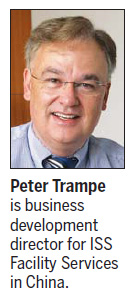Special
Zen and the art of doing business
Updated: 2011-01-07 11:39
By Patrick Whiteley (China Daily European Weekly)
Knowing the lay of the Chinese mainland is vitally important for European executives based in Beijing, Shanghai or Guangzhou.
The cities may appear modern on the outside, but behind the glass-covered high-rises and inside the chic-designed offices lies attitudes that are vastly different from the West.
"Business as we know it in China is only about 30 years old," says Peter Trampe, business development director for ISS Facility Services in China.
However the underlying traditions of business in China grow from Buddhist and Confucian teachings that emphasize humility, social harmony and patience. These Chinese traits are frequently at odds with the individualism of fast-paced Western business culture.
Trampe, a Danish national who speaks fluent Mandarin, lists a lengthy succession of factors that influence the conduct of business in China.
First, he says, Westerners must understand that Chinese tend to be loyal to individuals -mentors, patrons and bosses whom they trust - but not necessarily to companies. As a result, the departure of a respected manager from a company can lead to the loss of several other employees.
"If Mr. Wang leaves, 14 other people might go with him," Trampe says.
|
 |
Trampe's connection with China first began in the late 1970s when he joined the Denmark-based shipping, trading and industrial conglomerate, The East Asiatic Company, and was serving an apprenticeship in import and exports division.
By the time he was 18, he was soon attached to the company's China desk.
Like most Europeans, he could already speak several languages, but Mandarin was not one of them.
After military service in the Danish Queens Guards, Trampe was one of two workers sent to China to learn the local lingo.
"Nobody in the company had been given the chance to learn Chinese before taking up the duties, so they picked us and we went to Hong Kong in 1980 to study," he says.
For six months he was based in Hong Kong, spending 6 hours a day learning Mandarin and after these introductory lessons were finished, he moved to the Chinese mainland.
"I had an office chair, an IBM typewriter and my luggage and wheeled everything across the rail road bridge border on my chair," he says. "In those days everything for personal and office use had to be imported."
Trampe later joined FLS in 1984, a global supplier of equipment and services to the cement manufacturing industry, and hit the decks running.
"China needed enormous amounts of cement, and we had good government relations and a lot of work cut out for us. We had the right technology and business insight - when we bid for 10 projects we would win nine of them."
"But I didn't have a plan that I would stay in China forever."
Trampe finally left China in 1989 working for various businesses until 2005 when he received a call from the CEO of ISS, the world's largest FM service provider, asking him to help develop the Denmark-based company's newly acquired interests in China.
In April, 2005, ISS purchased the largest cleaning company in the country, Hong Run, and later catering and property management businesses in Shanghai and Beijing and his knowledge and China experience was a handy asset.
Trampe says it is also important to understand the Chinese view of contracts, which tends to be situational.
"In the West, we see a contract as setting out rights and obligations of parties to an agreement. In China they view a contract as a document of expected rights and obligations, unless the situation changes.
"And because business is only 30 years old, contract law has fewer precedents and tends to draw on local custom. For this reason large legal contracts, as we know them in the West becomes less important and therefore the trust and balance in a partnership are the governing factors.
Based as it is, on tradition, face and respect for rank, Chinese business culture tends to be hierarchical and communication runs one way, from top to bottom."
Trampe says this means employees will be very reluctant to ask questions of their managers.
It also implies that the imposition of matrix organizational structures is usually doomed to failure and empowerment of employees only works with younger people who are more open to new ideas and leadership styles.
Trampe says he has a lot of faith in the China business prospects and is constantly impressed with the progress made in the last 30 years.
E-paper

Ear We Go
China and the world set to embrace the merciful, peaceful year of rabbit
Preview of the coming issue
Carrefour finds the going tough in China
Maid to Order
Specials

Mysteries written in blood
Historical records and Caucasian features of locals suggest link with Roman Empire.

Winning Charm
Coastal Yantai banks on little things that matter to grow

New rules to hit property market
The State Council launched a new round of measures to rein in property prices.
